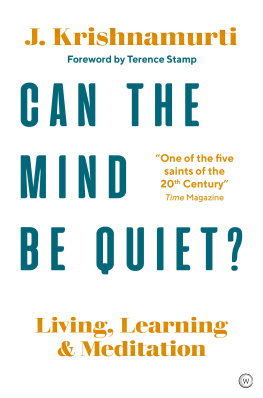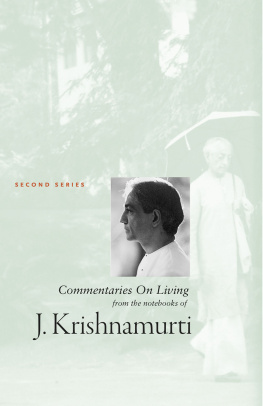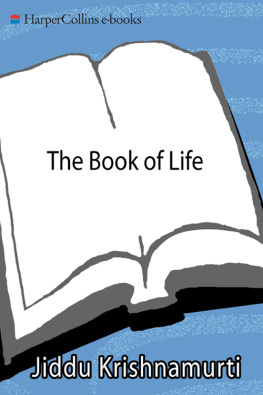Krishnamurti and Allan W Anderson - A Wholly Different Way of Living
Here you can read online Krishnamurti and Allan W Anderson - A Wholly Different Way of Living full text of the book (entire story) in english for free. Download pdf and epub, get meaning, cover and reviews about this ebook. publisher: Krishnamurti Foundation India, genre: Religion. Description of the work, (preface) as well as reviews are available. Best literature library LitArk.com created for fans of good reading and offers a wide selection of genres:
Romance novel
Science fiction
Adventure
Detective
Science
History
Home and family
Prose
Art
Politics
Computer
Non-fiction
Religion
Business
Children
Humor
Choose a favorite category and find really read worthwhile books. Enjoy immersion in the world of imagination, feel the emotions of the characters or learn something new for yourself, make an fascinating discovery.

- Book:A Wholly Different Way of Living
- Author:
- Publisher:Krishnamurti Foundation India
- Genre:
- Rating:3 / 5
- Favourites:Add to favourites
- Your mark:
- 60
- 1
- 2
- 3
- 4
- 5
A Wholly Different Way of Living: summary, description and annotation
We offer to read an annotation, description, summary or preface (depends on what the author of the book "A Wholly Different Way of Living" wrote himself). If you haven't found the necessary information about the book — write in the comments, we will try to find it.
A Wholly Different Way of Living — read online for free the complete book (whole text) full work
Below is the text of the book, divided by pages. System saving the place of the last page read, allows you to conveniently read the book "A Wholly Different Way of Living" online for free, without having to search again every time where you left off. Put a bookmark, and you can go to the page where you finished reading at any time.
Font size:
Interval:
Bookmark:
A Wholly Different Way of Living
Copyright 1991 Krishnamurti Foundation Trust Ltd.
A Wholly Different Way
of Living
J. K RISHNAMURTI
In dialogue with
Professor Allan W Anderson
CONTENTS
DIALOGUE I
Knowledge and the Transformation of Man
D R A NDERSON : Mr Krishnamurti, I was very taken with a recent statement of yours in which you said that each human being is responsible for bringing about his own transformation, which is not dependent on knowledge or time. And if its agreeable to you, I thought it would be a splendid thing if we explored together the general area of transformation itself, and after that perhaps the other related areas would begin to fall into place and we could discuss the relationship between them.
K RISHNAMURTI : Dont you think, sir, considering whats happening in the world, in India, in Europe and in America, the general degeneration, in literature, in art, and especially in the deep cultural sense, in religion, that there is a traditional approach, a mere acceptance of authority, of belief, which is not really the religious spirit? Seeing all this, the confusion, the great misery, the sense of infinite sorrow, any observant and serious person would say that this society can be changed only when the individual human being really transforms himself radically, that is, regenerates himself fundamentally. And the responsibility for that depends on the human being, not on the mass or on the priests or on a church, a temple, but on a human being who is aware of this enormous confusion, politically, religiously and economically; in every direction there is such misery, such unhappiness. And when you see that, it is a very serious thing to ask oneself whether a human being like oneself or another can really deeply undergo a radical transformation. And when that question is put, and when one sees ones responsibility in relation to the whole, then perhaps we can discuss what relationship knowledge and time have to the transformation of man.
A: I quite follow. We need to lay some groundwork.
K: Yes. Because most people are not seriously concerned with the events, with the chaos, with the mess in the world at present. They are concerned only with the problems of energy, of pollution and so onsuch superficial things. They are not really deeply concerned with the human mindthe mind that is destroying the world.
A: Yes, I quite follow. What you have said places radical responsibility on the individual as such.
K: Yes.
A: There are no five-year plans that we can expect to help us out!
K: You see, the word individual is really not a correct one because the term, as you know, sir, means undivided, indivisible, in himself. But human beings are totally fragmented, therefore they are not individuals. They may have a bank account, a name, a house, but they are not really individuals in the sense of being total, complete, harmonious, whole, unfragmented, which is really what it means to be an individual.
A: Well, would you say then to move or make passage or, perhaps, a better word would simply be to change, since we are not talking about time, from this fragmented state to one of wholeness could be regarded as a change in the level of the being of the person. Could we say that?
K: Yes, but you see the word whole implies not only sanity, health but also holy. All thats implied in that one word whole. And human beings are never whole. They are fragmented, contradictory, they are torn apart by various desires. So when we talk of an individual, the individual is really a human being who is totally, completely whole, sane, healthy and therefore holy. And to bring about such a human being is our responsibility educationally, politically, religiously, in every way. And therefore it is the responsibility of the educator, of everybody, not just myself; it is your responsibility as well as mine, as well as his.
A: Its everyones responsibility.
K: Absolutelybecause we have created this awful mess in the world.
A: But the individual is the one who must make the start.
K: Its the business of the human being, each human beingit does not matter whether he is a politician or a businessman or just an ordinary person like me in the streetto realize the enormous suffering, misery, confusion there is in the world. And its our responsibility to change all that.
A: It is the responsibility of each human person.
K: Yes, whether he is in India or England or America or wherever he is.
A: If the change is going to start at all, its going to be with each one of us.
K: Yes, sir, with each human being. Therefore the question arises from that, does a human being realize with all seriousness his responsibility not only to himself but to the whole of mankind?
A: It wouldnt appear so from the way things go on.
K: Obviously not; each one is concerned with his own petty little selfish desires. So responsibility implies tremendous attention, care, diligencenot negligence as is the case now.
A: Yes, I do follow that. The word we used in relation to each brings about the suggestion of a relationship which we could perhaps pursue here a moment. There seems to be an indivisible relation between each of us and what we call the whole, which the individual doesnt sense.
K: Sir, as you know, I have been all over the world, except behind the Iron Curtain and to China, the Bamboo Curtain. I have talked to and seen thousands and thousands of people. I have been doing this for fifty years and more. Human beings wherever they live are more or less the same. They have their problems of sorrow, problems of fear, problems of livelihood, problems of personal relationship, problems of survival, overpopulation and the enormous problem of deathit is a problem common to all of us. There is no Eastern problem or Western problem. The West has its particular civilization and the East has its own. But all human beings are caught in this trap.
A: Yes, I follow that.
K: They dont seem to be able to get out of it. They have been going on and on in it now for millennia.
A: Therefore the question is, how does one bring this about? The word individual, as you have just described it, seems to me to have a relationship to the word transform in itself. It seems that many people have the notion that to transform a thing means to change it utterly without any relationship whatsoever to what it is as such. That would seem to ignore that we are talking about form that undergoes a change, while form still abides.
K: Yes, sir, I understand.
A: Otherwise the change would involve a loss, a total loss.
K: So are we asking this question, sir: what place has knowledge in the regeneration of man, in the transformation of man, in a fundamental, radical movement in man? What place has knowledge and therefore time? Is that what you are asking?
A: Yes, I am. Because either we accept that a change which is a genuine change means the annihilation of what preceded it, or we are talking about a total transformation of something that abides.
K: Yes. So let us look at that word for a minute. Revolution in the ordinary sense of that word does not mean a gradual evolution, does it?
A: I agree.
K: Now, revolution is either bloody, overthrowing the government, or there is a revolution in the psyche. Outer or inner.
A: Yes, outer or inner.
K: The outer is the inner. The inner is the outer. There is no difference between the outer and the inner; they are totally related to each other.
A: Then this goes back to what you mentioned earlier. There is no division, even though intellectually you make a distinction, between the I and the we.
K: Thats right. So, when we talk about change, we mean not a mere bloody physical revolution, but rather a revolution in the makeup of the mind of the human being, the way he thinks, the way he behaves, the way he conducts himself, the way he operates, functions, the whole of that. Now, in that psychological revolutionnot evolution in the sense of gradualnesswhat place has knowledge in that? In the regeneration of man, which is the inward revolution which will affect the outer.
Next pageFont size:
Interval:
Bookmark:
Similar books «A Wholly Different Way of Living»
Look at similar books to A Wholly Different Way of Living. We have selected literature similar in name and meaning in the hope of providing readers with more options to find new, interesting, not yet read works.
Discussion, reviews of the book A Wholly Different Way of Living and just readers' own opinions. Leave your comments, write what you think about the work, its meaning or the main characters. Specify what exactly you liked and what you didn't like, and why you think so.





